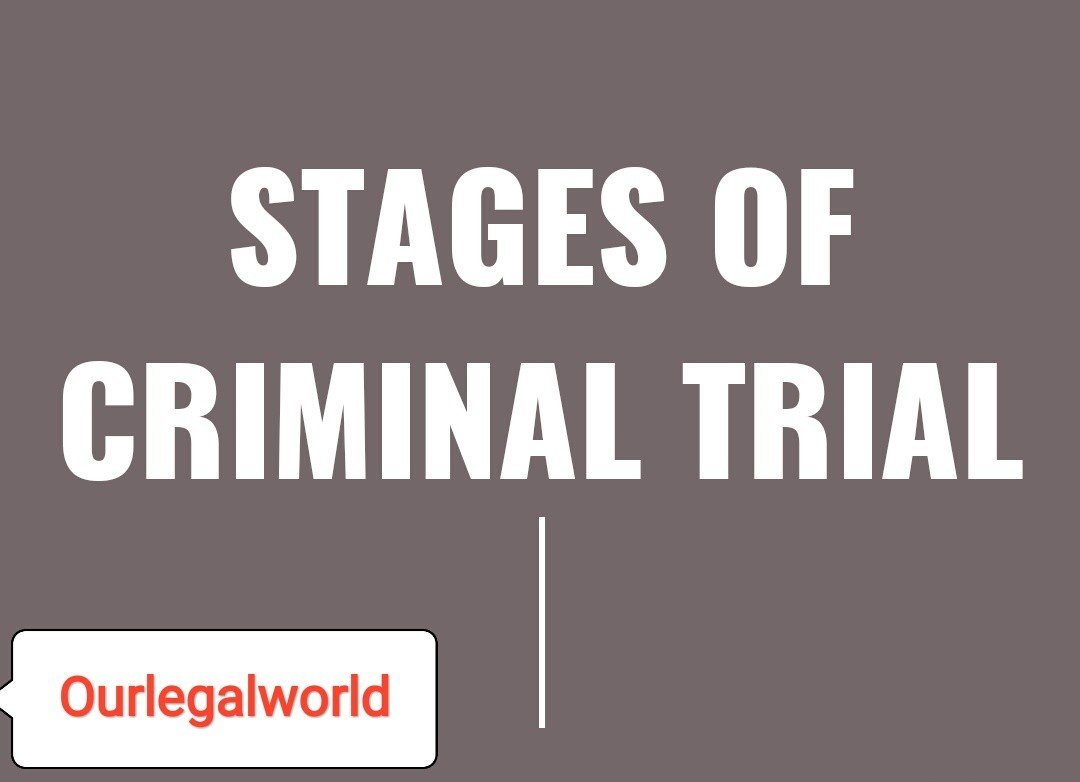STAGES OF CRIMINAL TRIAL- With Short Explanation
STAGES OF CRIMINAL TRIAL UNDER CrPC
Normally a Criminal Trial has to travel through main stages from the lodging of F.I.R. till its judgment, they are as under:-
1. FIR :- Any person can launch prosecution against the person committing any legal wrong. A complaint can be lodged orally or reduced into writing before the police station within whose jurisdiction an offence is committed. The Police Officer-in-charge of the police station considers the complaint and registered
2. Inquiry and Investigation:- An police officer after the receipt of the complaint under section 154 of the Code of Criminal Procedure, and matter is taken up for investigation.
2-A. If the Police Officer in-charge does not find any material in the complaint then he can register the complaint under section 155(2) of Code of Criminal Procedure and issues a receipt thereof to the complainant.
3. Upon registering the F.I.R. and during an investigation, a Police Officer can arrest the suspect and took him for remand. Soon after the arrest the accused has to be produced before the Magistrate within 24 hours from the time of his arrest, for authorizing further detention as contemplated under section 57 of Code of Criminal Procedure.
4. The Police Officer in-charge can ask for Police Custody of the accused under section 167 of Code of Criminal Procedure if the investigation cannot be completed within 24 hours. (See Sec 57 of Cr.P.C.)
5. The magistrate considering the application can grant Police Custody to the accused which shall not be more than fifteen days in the whole.
5-A. If the magistrate does not fit it properly to grant police custody then the accused is taken in Magisterial Custody. (See Sec 167 of Cr.P.C.)
6. Soon after the MCR, an accused can apply for a grant of Bail, within the provisions of sections 436, 437 and 439 of the Code of Criminal Procedure.
7. During the investigation, a police officer in-charge can search, and seize the material from the possession of the accused, or elsewhere kept by the accused. ( See Section 27 of the Evidence Act )
8. After the completion of the investigation, if the police officer found an incriminating substance and a prima facie case is made out, then he put up a charge sheet against the accused. If the offence is punishable with death, life or not less than 10 years, then a charge sheet is to be filed within 90 days. Whereas the offence is punishable less than 10 years then the charge sheet is to be filed within 60 days. ( See Section 167 (2) (a) (i) and (ii) of Cr.P.C.
8-A. Upon receipt of charge sheet under section 173 of Code of Criminal Procedure, the court can either accept the charge sheet and put the accused to trial or reject the charge sheet and discharge the accused.
8-B. If upon the completion of an investigation, the police officer does not find any prima facie case, then he can file a final report requesting a discharge of accused.
8-C. Upon receipt of the final report, the magistrate can either direct the police officer to re-investigate and file a report or can issue notice to the complainant for hearing upon the final report requesting the discharge of accused.
8-D. If the complainant does not satisfied with the final report requesting the discharge of the accused, he can request for treating the same as a protest petition and try the accused independently.
The Hon’ble Apex Court in V.C.Shukla Vs. State reported in C.B.I.1980 Supplementary SCC 92 at page 150 opined that the purpose of framing a charge is to give intimation to the accused of clear, unambiguous and precise notice of the nature of accusation that the accused is called upon to meet in the course of a trial.
9. On acceptance of the charge sheet, the accused has to take necessary bail from the court and the matter is posted for plea or charge as the case may be. Whenever the offence is punishable with two years of punishment, then such cases are called as summons cases and tried as summary trials with the exception of section 260 of Cr.P.C. and the rest of the matters are tried as summons case. (See Section 239, 240 and 251 of Cr.P.C.)
10. On complying with section 251 or 240 as the case may be, the matter is posted for evidence of the prosecution witness. (See sections 242 and 254 of Cr.P.C.)
11. Sometimes prior to the commencement of evidence of prosecution the prosecution issues notice under section 294 of Cr.P.C. to admit documents to the accused. By this way the evidence of the witnesses for which the document is admitted is curtailed during the trial.
12. Whenever the evidence is to be recorded, the court has to record the evidence as provided under section 274 of Cr.P.C. for the summons case and section 275 of Cr.P.C. for the warrant case. For summary trial u/s 260 of Cr.P.C. the evidence is recorded as provided under section 263 of Cr.P.C.
13. After recording the evidence, the matter is posted for statement of accused under section 313 of Cr.P.C, wherein the incriminating evidence brought against the accused is explained to the accused.
14. Thereafter the matter is posted for evidence of the defense if any. If the accused does not desire to adduce his own evidence or any other evidence in his defense then matter is posted for Arguments. (See Section 314 of Cr.P.C. for arguments )
15. After the completion of arguments the matter is posted for judgment. If there is a judgment of acquittal in a summons case then it is to be given under section 255(1) of Cr.P.C. and conviction under section 255(2) of Cr.P.C.
16. Similarly the judgment of acquittal in warrant cases are given under section 248(1) of Cr.P.C. and conviction under section 248(2) of Cr.P.C.
17. If the conviction is given, then a copy of the judgment is to be provided to the accused forthwith free of cost.
18. In case of sentence the magistrate is empowered to pass the sentence up to three years and fine not exceeding Rs. 10,000/-. Similarly the CJM can pass sentence up to 7 years. ( see Section 29 of Cr.P.C.)
19. The sentence of imprisonment in default of payment of fine can be given not exceeding 1/4th of the sentence which the magistrate can inflict as punishment. (See Section 30 of Cr.P.C.)
20. The magistrate can also award compensation to the complainant while recording the judgment of conviction. ( See Section 357(1) and 357 (2) of Cr.P.C.)
21. If the accused has undergone any detention during the period of investigation and trial then while convicting him, a set off can be given under section 428 of Cr.P.C.)
22. Upon conviction, the accused can request for suspension of sentence under section 389 (3) of Cr.P.C.
23. In view of section 437-A of Cr.P.C. accused has to submit bail bonds to appear before the next appellate court.







